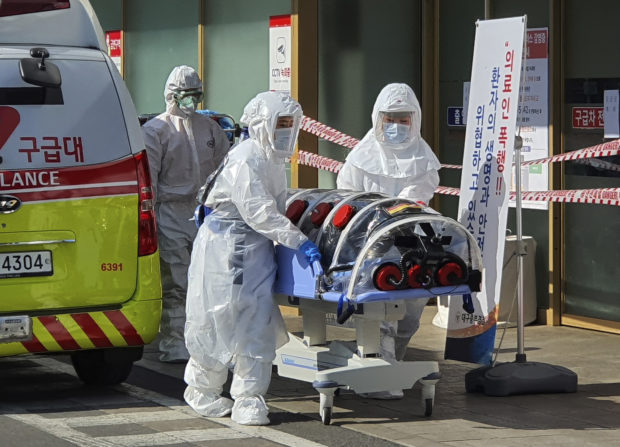South Korea reports 1st COVID-19 death

In this Wednesday, Feb. 19, 2020, photo, medial workers wearing protective gears move a patient suspected of contracting the coronavirus from an ambulance to the Kyungpook National University Hospital in Daegu, South Korea. The mayor of the South Korean city of Daegu urged its 2.5 million people on Thursday, Feb. 20, to refrain from going outside as cases of a new virus spike. (Kim Jong-un/Yonhap via AP)
SEOUL — Yonhap news agency said South Korea has reported its first death from the novel coronavirus, which has been officially named COVID-19.
The Korea Centers for Disease Control and Prevention did not immediately provide details.
The report came as South Korea is struggling to cope with the outbreak and its economic fallout.
Earlier Thursday, South Korea said it has confirmed a total of 82 cases of the virus.
Also, the mayor of the South Korean city of Daegu has urged its 2.5 million people to refrain from going outside as cases of the novel coronavirus, linked to a church congregation, spiked. He likewise pleaded for help from the central government.
Article continues after this advertisementMayor Kwon Young-jin made the appeal in a nationally televised news conference after the southeastern city and its nearby towns reported 35 additional cases of infection with the new coronavirus on Thursday.
Article continues after this advertisementKwon also asked Daegu citizens to wear masks even indoors if possible. He expressed fears that the rising infections in the region will soon overwhelm the city’s health infrastructure and called for urgent help from the central government in Seoul.
“National quarantine efforts that are currently focused on blocking the inflow of the virus (from China) and stemming its spread are inadequate for preventing the illness from circulating in local communities,” Kwon said.
The Korea Centers for Disease Control and Prevention said 28 of those 35 new patients went to church services attended by a previously confirmed virus patient or contacted her at other places inside a Daegu church. That patient is a South Korean woman in her early 60s who has no recent record of overseas travel, according to center officials. She tested positive for the virus on Tuesday, becoming the 31st case in South Korea.
On Wednesday morning, Daegu confirmed 13 cases and 11 of them either went to the same church with the woman patient or contacted her at a hospital, according to the disease control center.
The Shincheonji Church of Jesus, which claims it has about 200,000 followers in the country, said it has closed all of its 74 churches around the nation and told followers to instead watch its online worship services on YouTube. It said in a statement that health officials were disinfecting its church in Daegu, which the woman patient went to, while tracing her contacts. That Daegu church has about 8,000 followers.
According to the church statement, church officials had been advising followers since late January to stay at home if they had recently traveled overseas or were experiencing even mild cold-like symptoms. But the 31st patient assumed she was having a common cold and kept coming to her Daegu church because she didn’t travel overseas, church officials said.
“We think it’s deeply regrettable … for causing concerns to the local community,” the statement said.
The explosion of infections in Daegu and the neighboring southeast region, as well as some new cases in the Seoul metropolitan area where the sources of infections were unclear, have raised concern that health authorities are losing track of the virus as it spreads more broadly in the country.
Kwon spoke shortly before South Korea’s government for the first time acknowledged that the country was beginning to see a “community transmission” of the illness, albeit at a “limited range.”
“We are seeing infections in some areas like Seoul and Daegu where it’s difficult to confirm the cause or routes of the infections,” Kim Gang-lip, South Korea’s vice health minister, said in a briefing.
“Our judgment is that (COVID-19) which has been introduced from abroad is beginning to spread through community transmissions in limited ranges,” he said, adding that the government would need to change its quarantine strategy that has been focused on tracing contacts.
South Korea has reported a total of 82 cases of COVID-19, a disease first detected in Wuhan, China, in December.
In a telephone conversation with Kwon later Thursday, President Moon Jae-in said the central government will make all available assistance to help Daegu fight against the virus’ further spread, according to the presidential Blue House.
For more news about the novel coronavirus click here.
What you need to know about Coronavirus.
For more information on COVID-19, call the DOH Hotline: (02) 86517800 local 1149/1150.
The Inquirer Foundation supports our healthcare frontliners and is still accepting cash donations to be deposited at Banco de Oro (BDO) current account #007960018860 or donate through PayMaya using this link.